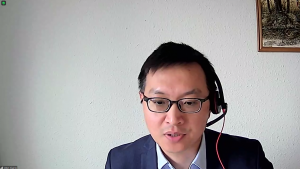On 25 October 2021, the Finnish China Law Center held an online mini seminar on the topic of ‘Smart Courts and the Informatization of China’s Judicial System’. The event is part of the Center’s new mini seminar series on topical issues of Chinese law.

The seminar was chaired by Johanna Niemi, Professor of Procedural Law at University of Turku and Board Member of the Finnish China Law Center.
The seminar began with a presentation by Björn Ahl, Professor and Chair of Chinese Legal Culture at the University of Cologne on ‘The Development of Chinese Smart Courts within the Broader Context of Judicial Reform’. He remarked that as China is currently at the forefront of technical and digital development, its experience in smart courts and judicial reform would be a good subject for comparative study.

Professor Ahl started with an introduction on the description of smart courts. In a smart court, litigation activities are carried out online with limited human interference. Software applications, algorithms and big-data analytics are used to support the judicial process. He noted that the smart courts form a small part of the overall policy toward judicial informalization. The objective of judicial informatization and smart courts is to create a more just and fairer judiciary, more consistent adjudication and better monitoring and supervision of cases. Professor Ahl also gave some examples of the applications utilized in smart courts including systems that can automatically draw analogy between similar cases to provide in-depth materials and guidance in decision-making for judges to review and those that to systems that can process and cross-examine case texts and parties’ information to determine if there are any overlapping procedures.

The second presentation titled ‘The Rise of Smart Courts in China: A Pathway to E-justice in the Digital Age?’ was given by Wen Xiang, Associate Professor at the Faculty of Law of the University of Copenhagen. He explained that the reason behind the need for smart courts in China is the sharp increase of cases which places heavy burden on judges. Since 2013, China has initiated the informatization of courts. Internet courts were established in Hangzhou (2017), Beijing (2018) and Guangzhou (2018). Professor Xiang then gave a brief introduction of four of the techniques that have been employed in smart courts including electronic case-filing, remote trial, online mediation platform and electronic delivery system. He stated that smart courts have the potential to promote quality of justice, improve judicial efficiency, provide convenience for the people, and build judicial big data system.
In their presentations, both Professors expressed concerns regarding potential bias in algorithms in smart courts, possible inaccuracy in algorithm-based and data-based decision-making mechanisms, uncertainties about the influence of private developers on the deliver of justice, lack of guideline on data security and protection of privacy, and unequal access to technology.
